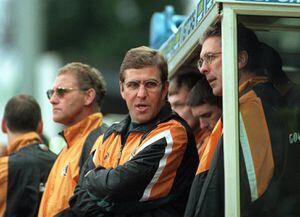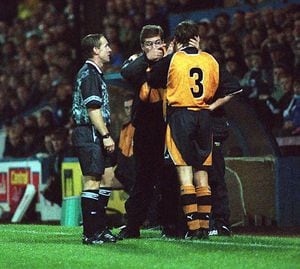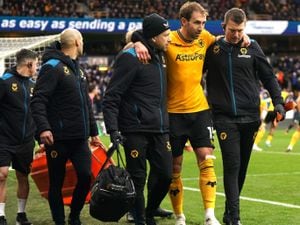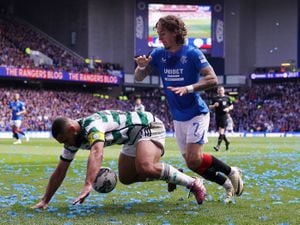Sky Sports' Johnny Phillips: 25 years on, Mark McGhee still bears the scars
This month marks the 25th anniversary of the arrival at Wolves of the original three-at-the-back manager.
Nuno Espirito Santo was a 21-year old second-choice keeper at Vitoria Guimaraes when Mark McGhee walked into Molineux to great fanfare on 13 December 1995.
Graham Taylor’s colourful, 20-month tenure had come to a dispiriting end a month earlier. McGhee would spend almost twice as long at Molineux as his predecessor, but what began as a marriage with one of the country’s brightest young coaches – tipped to one day succeed Sir Alex Ferguson at Manchester United – ended in a resentful divorce with both parties sullying their standing in the game.
There were issues from the outset. Wolves tarnished their reputation to prise McGhee from Leicester, paying a record compensation fee when he walked out on them with his assistants Colin Lee and Mike Hickman.
McGhee had spent heavily at Filbert Street to build an attractive side which went on to secure promotion to the Premier League, as Wolves limped to a 20th-place finish in the First Division, three points above the relegation zone.
McGhee invested heavily at Wolves, too, and the 1996/97 season bore a resemblance to Taylor’s only full campaign.
Wolves were the much-fancied big-hitters of the division but couldn’t keep pace with Bolton Wanderers at the top. As springtime emerged McGhee’s men found themselves in a battle for second with relative minnows Barnsley.
There is no doubt that McGhee had an unhappy knack of conducting team talks for the opposition, not settling for putting one foot in his mouth when there were two at his disposal. Perhaps, at just 38 on his appointment, he lacked the experience to understand how his words might be interpreted.
When asked about the tussle for promotion, McGhee told reporters: “I would guarantee that most of the Premiership clubs would like it to be Barnsley. They might fancy the prospect that Barnsley would be annihilated next season and thrown to the sharks.”
Those quotes became the stuff of legend in South Yorkshire. “It gave us a bit of a boost, I know that,” said Danny Wilson, then-Barnsley manager, in the documentary Daydream Believers.
“I just smiled and thought, ‘Well, what better comments could you want for?’.”
Barnsley pipped Wolves, who lost in a play-off semi-final against Crystal Palace. If McGhee was rubbing some up the wrong way publicly – and the promotion failure provoked a bitter outburst from owner Sir Jack Hayward – there was a more personable side to the man which did not always shine through.
Speaking to long-serving secretary Richard Skirrow, for the book Bitten By Wolves, it was clear McGhee had plenty of time for the club staff and cared deeply. When McGhee plucked Robbie Keane from the youth team for an opening day debut in the 1997/98 season, he ensured the youngster’s family was told in advance, to give them time to travel over from Ireland for the match.
Ahead of Wolves’ FA Cup quarter-final at Leeds in 1998, supporters were queuing overnight at Molineux for tickets. “I remember Mark and his wife Jacqui turning up at midnight to speak to fans,” recalled Skirrow. “That never got much publicity.”

The Cup tie at Leeds, who would finish fifth in the Premier League, was a tactical masterclass from McGhee and was one of Wolves’ great victories of the decade. Keith Curle, Dean Richards and Adrian Williams formed a three-man defence, with George Graham’s side unsettled at the back by the presence of Don Goodman, Steve Bull and Dougie Freedman in attack.
But the over-riding impression of McGhee’s tenure was one step forward, two steps back. Such as the team selection for the semi-final against Arsenal.
Bull and Keane stayed on the bench whilst stop-gap signing Steve Claridge was preferred up front. The 1-0 defeat was a desperately damp squib for supporters.
Winger Steve Froggatt suggested there was logic behind the selection. “Stevie (Claridge) scored in cup finals, he was a big-game player but it back-fired and didn’t work,” he said.
“Although, do I think we’d have beaten Arsenal? They were that unbelievably good that, had we scored a goal, I think they would have gone up another two gears.”
Froggatt believes he played the best football of his career under McGhee, much of it at wing-back, and Wolves started the 1998/99 season with four straight wins. But he was one of several players sold early that campaign as Sir Jack looked to recoup some of his money. By the November, McGhee’s time was up after a run of two wins in 14 games.
McGhee’s relationship with the players was not always as strong as it should have been. Several have gone on record since, suggesting his man-management was poor. The treatment of Freedman was a particular frustration, given his innate talents and obvious capabilities at that level. Perceptions of both McGhee and Wolves had changed by the time of his departure.
No longer the bright, young prospect, his next two jobs came in the third tier at Millwall and Brighton.
He won promotion with both clubs, and took Millwall into the First Division play-offs, losing out in the semi-finals once more. Wolves, meanwhile, were sullied by the manner of their approach for McGhee and another excessive outlay on players following on from Taylor’s spending. They were a prized scalp for many in the division.
If Taylor’s era brought an air expectation amongst the Wolves support, McGhee’s brought resentment.

By the end, supporters were disillusioned and fed up. So, too, was the owner and a period of introspection followed. The club buckled down and became more self-sufficient with McGhee’s former assistant, Lee, soldiering on for a couple more years.
Even that appointment led to a long fall-out between the pair. Only when Dave Jones arrived in early 2001 did Sir Jack rediscover his appetite for a challenge, sanctioning a final bout of spending that took Wolves to the top.
In 2016, as McGhee approached his 900th game in club management, with Motherwell, he reflected on a career unfulfilled and those two First Division play-off failures.
“Losing in play-off games were the worst moments of my career,” he explained. “These were chances to go into the Premier League and they were life-changing games.
“That is the reason – and don’t misinterpret me – why I’m managing Motherwell and not Liverpool. If I had won promotion on either of these occasions, the chances are that’s the kind of place I would be.
“That’s the progression you need to make if you want to manage in the Premier League and I failed to make it so that’s why I feel unfulfilled.”
Liverpool? That is perhaps over-egging the sliding doors moment but there could have been a different path had that Crystal Palace semi-final gone his way back in 1997.
The Wolves job, in particular, left its scars. Perhaps the expectation was too much for such a young manager to handle.
McGhee had bags of self-belief back then, which all managers need, but it manifested itself in a manner which did not always serve him well.
Wolves became a difficult club to manage in the 1990s, but McGhee did not make the job any easier.





